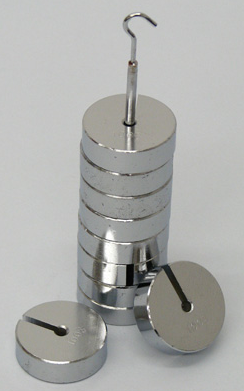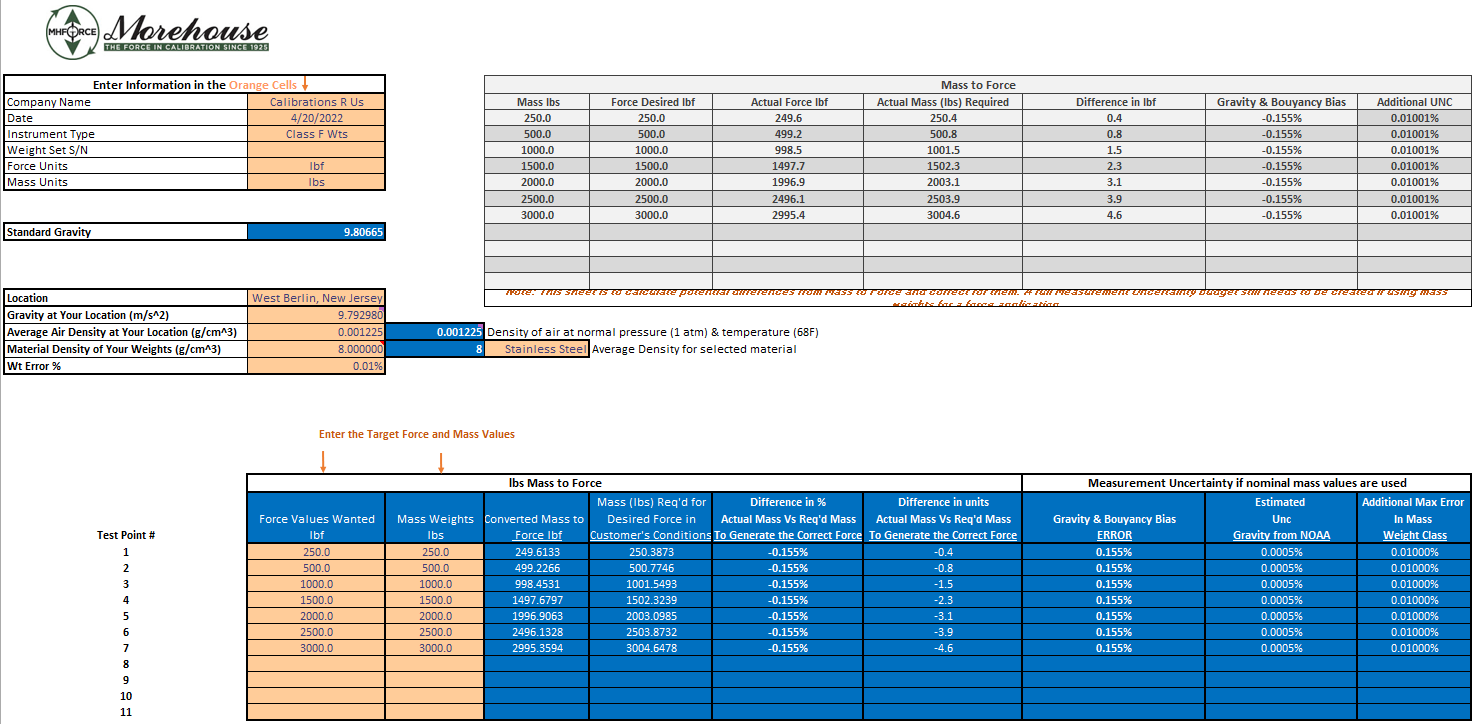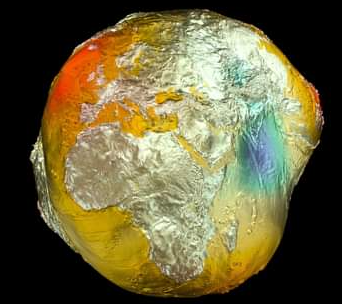Need to convert lbs to lbf? What about kgs to kgf?

Need to convert lbs to lbf?
Do you have mass weights that you might want to use for a force or torque application?
Morehouse has created an excel spreadsheet that is free to download to help eliminate large measurement errors from using mass weights.
Download Force to Mass Excel Document Here

Using mass weights to calibrate force devices can result in a large measurement error.
When metrologists talk about measurement error, we discuss the difference between the nominal value and the reading observed on the instrument when the nominal value is applied.
If 10,000 lbf is applied to a force-measuring device and the readout displays 10,002 lbf, then the device has a 2 lbf bias; logically, if we load the same force-measuring device to 10,002 lbf, we will have applied 10,000 lbf. This is a measurement error for which there can be many different causes.
In discussions with many professionals inside the weighing industry, we have found that some labs use mass weights to calibrate force devices. These include dynamometers, crane scales, handheld force gauges, and many other types of weighing devices, resulting in significant measurement errors.
Let us quickly review the difference between mass and force. Mass, under almost every terrestrial circumstance, is the measure of matter in an object.
However, measuring force takes additional factors into account: air density, material density, and gravity.
It is the effect of gravity that can produce significant errors when comparing mass and force measurements.

Gravity is not constant over the surface of our not flat Earth. The most extreme difference is 0.53 % between the poles and the equator (983.2 cm/s2 at the former compared to 978.0 cm/s2 at the latter).
A force-measuring device calibrated in one location using mass weights and then deployed somewhere else will produce different physical elements and the resulting measurement errors can be significant.
Correcting for the difference in force and mass measurements is possible. When adjusting a device for force measurements, the device will measure force without additional error for gravity correction, air density correction, and so on.
However, when a force instrument is calibrated using mass weights, there will be large errors.

These errors could be in any measurement involving force. Examples would include a torque calibration using an arm or wheel of a nominal length and mass weight. Torque is not force times mass, it is force times length.
Someone may calibrate a load cell, crane scale, force gauge, or tension link using mass weights, and then ship the instrument somewhere else where the errors might far exceed the tolerance.
Such an error is shown in the image above as the error for not correcting for air buoyancy and local gravity in West Berlin, New Jersey is about 0.155 % if Class F weights are used, which exceeds the typical tolerances of 0.1 % of applied force on many force measuring devices.

The Morehouse lbs to lbf conversion shown above in our spreadsheet will reduce these errors by correcting whatever class mass weights to force units. The sheet can convert lbs to lbf, lbs to kgf, kgs to kgf, and kgs to lbf.
To convert to force, we use a formula:
Force = M x g / 9.80665 (1 – d/ D)
Where M = mass of weight in lbs, g = gravitational constant at fixed location in m/s2, d = air density in g/cm^3, and D = material density g/cm^3
The spreadsheet asks the end-user to provide information about their air density, and gravity and lists various material densities to get as close to the correct force.
There are still errors, which if used properly, should be the errors in the class of weights, plus additional errors likely much less than 0.01 % of applied.
The sheet presents all the information in a summary force to mass table shown above. The total error contains an additional error source from the mass weights class. It is added to the overall difference to be on the conservative side.
When converting mass weights to force, the weights are likely to be strange values that are not nominal values. If this is an issue, we recommend purchasing weights or equipment capable of generating Forces correctly.
Morehouse can supply such equipment. If the decision is made to convert the mass weights to force, an uncertainty analysis will need to be performed.
Convert lbs to lbf with Morehouse Easy to use Conversion Spreadsheet- Conclusion
I take great pride in our knowledgeable team at Morehouse, who continue to work with everyone, clarify complex topics, and provide tools such as free guidance documents, excel sheets, and products to help you make better force measurements.
We want to make sure everyone knows not to use mass weights for force applications without using our spreadsheet tool to convert lbs to lbf correctly.
At Morehouse, we educate our customers and provide solutions to you. Most of these solutions are available for free to help you make better measurements and can be found here.
We have been in business for over a century and focus on being the most recognized name in the force sensor calibration business. That vision comes from educating our customers on what matters most and having the proper discussions about tension link calibration.
If you have more questions about Morehouse products, need adapters, load cells, calibration, or other questions don't hesitate to get in touch with us @ 717-843-0081 to talk to a live person or email info@mhforce.com. Visit us on the web at mhforce.com.
If you enjoyed this article, check out our LinkedIn and YouTube channel for more helpful posts and videos.
#lbs to lbf #kgs to kgf
Our Morehouse Easy to use lbs to lbf Conversion Spreadsheet can be found here.
To be notified of new videos, subscribe to our YouTube channel here.


